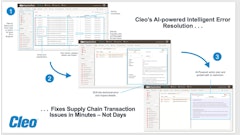Supply chain security coalition urges Senate to pass strong port security legislation without impeding flow of goods, damaging economy
Arlington, VA — September 7, 2006 — In a letter to every member of the Senate, the Supply Chain Security Coalition today called for passage of strong port security legislation, but expressed the united opposition of the business community and key stakeholders in the supply chain to so-called "100 percent scanning" amendments, calling such proposals unrealistic, a diversion of resources, and potentially damaging to the U.S. and global economies.
The Coalition represents some of the largest and most knowledgeable stakeholders in the supply chain system, including the Retail Industry Leaders Association (RILA).
The Senate debate, expected to begin today, follows passage in May of cargo and port security legislation, the SAFE Ports Act (H.R. 4954), by the House of Representatives by a vote of 421-2.
"RILA and other Coalition members hope that the Senate bill closely resembles the House bill. We took an active role in advocating for the final House bill that builds on the multi-layered, risk assessment model currently used by the Department of Homeland Security and which has worked to keep our ports safe for the last several years," explained Allen Thompson, RILA's vice president for supply chain policy.
"At the same time, our letter outlines our strong opposition to unrealistic "100 percent scanning" proposals," continued Thompson. "Amendments advocating such proposals could potentially decrease security by forcing containers to sit for extended periods of time, putting them at greater risk of tampering, and would divert resources away from the current successful risk assessment approach. In addition, such a mandate has the potential to significantly impede the flow of commerce and damage the U.S. and global economy."
The letter from the Coalition states, "According to the World Shipping Council, when the U.S. Customs and Board Protection Agency (CBP) currently scans questionable cargo, it takes 1-3 days to release that container back into the stream of commerce. With 11 to 12 million containers entering the U.S. every year, it is obvious that a mandate of 100 percent scanning has the potential to do significant damage to the flow of goods and to the U.S. economy."
The letter calls on the Senate to authorize further additional testing and evaluation of scanning technology: "Both the GreenLane Maritime Cargo Security Act passed by the Senate Homeland Security and Governmental Affairs Committee and the House-approved SAFE Ports Act address this issue by calling for pilot projects to test the effectiveness and operational ability to conduct 100 percent container scanning. In addition, the House bill requires the Secretary of Homeland Security to conduct an evaluation of scanning systems, taking into consideration false alarm rates and other operational issues, the impact on trade, the need for international cooperation, and the ability to integrate and deploy these systems overseas. These provisions represent the best approach to addressing this issue and will help to answer important operational and economic questions that will be critical to understanding how to effectively implement improved container scanning."
"These scanning proposals will not make Americans safer but instead increase the cost of just about everything that American consumers buy," said Thompson. "U.S. manufacturing depends on "just-in-time" delivery. Even a delay of several days in delivering needed inputs to U.S. manufacturing would have a devastating impact on the economy. A recent Washington Post editorial opposing 100 percent scanning proposals has it right: 'inspecting 100 percent of containers is a slogan, not a solution.'"
The Retail Industry Leaders Association (RILA) is a trade association. Its members include retailers, product manufacturers and service suppliers, which together account for more than $1.5 trillion in annual sales. RILA members operate more than 100,000 stores, manufacturing facilities and distribution centers, have facilities in all 50 states, and provide millions of jobs domestically and worldwide.
Additional Articles of Interest
- For more information on C-TPAT and solutions for supply chain security, see "Building the Secure Supply Chain," the Net Best Thing article in the June/July 2003 issue of Supply & Demand Chain Executive.
- Imminent terrorist attacks or no, your competitive advantage demands that you secure your company's supply chain. Read more in "Supply Chain Security: Is Your Company Complacent or Engaged?," in the February/March 2005 issue of Supply & Demand Chain Executive.
- Supply chain executives are discovering new ways to apply technology and innovative processes to the challenge of managing uncertainty. Read more in "Rethinking Risk," cover story in the August/September 2005 issue of Supply & Demand Chain Executive.



















